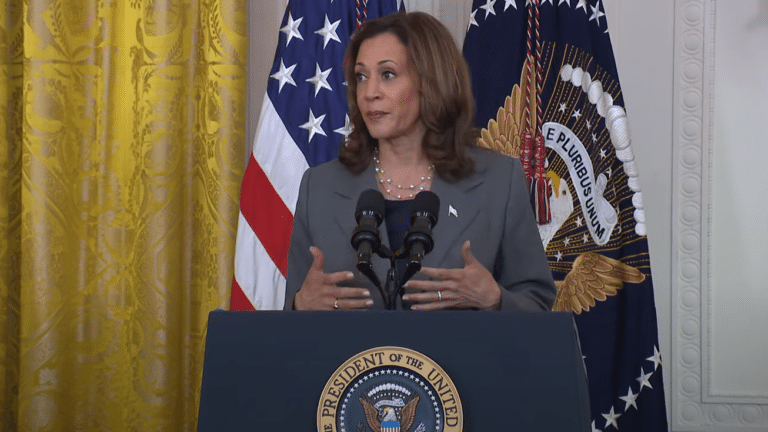Vice President Kamala Harris said the pistol possession ban she backed as San Francisco District Attorney was likely unconstitutional in a recently unearthed audio tape.
During a 2006 talk with the Commonwealth Club of California, Harris said the previous year’s ballot measure banning handguns was unlikely to survive a court battle. Her comments come about a year after she supported passage of the measure and about a year before she signed onto a Supreme Court brief defending Washington, DC’s similar ban.
“In a city like San Francisco, with our history, is there any justification for anyone to carry a gun, except for law enforcement, and why not ban them completely in the city?” moderator Mary Cranston asked Harris in audio first published by The Washington Free Beacon.
“Well, there’s been a measure on the ballot actually to do that, and it’s currently being challenged,” Harris replied, “and there’s a question about its constitutionality because, of course, the Constitution of the United States says that we do have a right to legally possess firearms.”
Harris went on to jokingly compare banning all guns to ending world hunger, arguing it was an unrealistic goal.
“It’d be great to end world hunger and a couple other things, too,” Harris said. “Are we going to really be able to get rid of people owning and possessing guns? I don’t know. I don’t think we’re anywhere close to that right now. So, I would not, like, put all my effort into that as being the solution because I think it’s a long way off.”
The comments provide further insight into Harris’s record and view on guns just weeks before voters go to the polls to decide whether she or Former President Donald Trump will be the next president. They show she has expressed a more pragmatic view of Second Amendment protections in smaller speaking venues than implied by her public support for the early 2000s city handgun bans. Gun policy has played a limited role in the 2024 election, but Harris has emphasized her own gun ownership in an attempt to convince voters she won’t come for theirs, as Trump has claimed.
“She has a plan to confiscate everybody’s gun,” Trump said during the September debate.
“This business about taking everyone’s guns away; Tim Walz and I are both gun owners. We’re not taking anyone’s guns away,” Harris responded a few minutes later. “So, stop with the continuous lying about this stuff.”
In 2019, Harris supported banning new sales of “assault weapons,” including the popular AR-15, and forcing current owners to sell their guns to the government.
“We have to have a buyback program, and I support a mandatory gun buyback program,” she said at an October 2019 forum.
Shortly after she took over the top of the Democratic ticket in July, her campaign walked back that support.
“Correct, the VP will not push for a mandatory buy back as president,” Lauren Hitt, a Harris spokesperson, told The Reload in July. “She has expressed support for red flag laws, universal background checks and an assault weapons ban.”
While Harris has repeatedly said she will not take anyone’s guns on the 2024 campaign trail, she and her campaign have not explained why she changed her position. Nor did they answer The Reload‘s questions on how she squares her support for those policies with her 2006 comments doubting their constitutionality or if she still believes the Constitution protects an individual right to own guns, as those comments imply.
For his part, Donald Trump supported an assault weapons ban in his 2000 book The America We Deserve. The New York Times also reported he considered backing one again after the 2018 El Paso shooting. However, he has not publicly pushed for a ban since becoming president–even shunning the idea after being shot by an attempted assassin using an AR-15 in July.
Harris was right to be skeptical that San Francisco’s 2005 handgun ban would hold up to court scrutiny. A California state appeals court threw it out in 2008, and the city was forced to pay hundreds of thousands of dollars in legal fees to the gun-rights litigants who challenged it. However, the ban was tossed for violating a state law that limited what regulations localities could put on guns.
“[T]he sheer breadth of Prop H makes it vulnerable to a preemption challenge,” Judge Ignazio John Ruvolo wrote for a unanimous state appeals court in Fiscal v. San Francisco. “As already noted, Section 2 of Prop H bans the ‘sale, manufacture, transfer or distribution’ of ammunition and firearms in the City, without exception. With narrow exceptions, Section 3 bans the possession of handguns by San Francisco residents, including possession within the sanctity of homes, businesses, and private property.”
Ruvolo concluded, “[W]hen it comes to regulating firearms, local governments are well advised to tread lightly.”
A few months later, the Supreme Court invalidated Washington, DC’s similar handgun ban for violating the Second Amendment. That decision mirrored Harris’s prediction, citing an individual right to own guns as the reason DC’s ban couldn’t stand. But the ruling also rebuffed a brief that Harris signed on to, which argued the Court should uphold a different view of the Second Amendment out of concern for how it could upend gun laws across the country.
The brief argued “for nearly seventy years” American courts held the view that “the Second Amendment provides only a militia-related right to bear arms, the Second Amendment does not apply to legislation passed by state or local governments, and the restrictions bear a reasonable relationship to protecting public safety and thus do not violate a personal constitutional right.” It said upending that understanding risked hindering prosecutors’ “ability to enforce criminal laws they have long understood to be valid and compromised in their continuing efforts to combat gun violence in their communities.”
The Supreme Court disagreed and affirmed that the Second Amendment protects an individual right to keep and bear arms outside militia service. The holding has been at the core of Second Amendment litigation since then, but many gun-control advocates still reject it.






